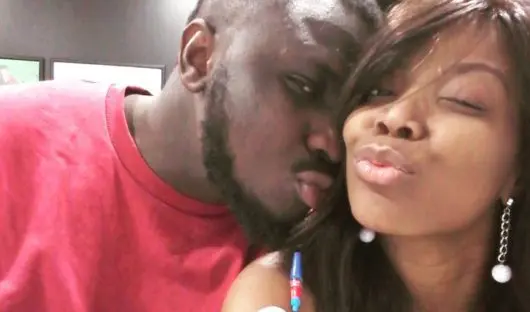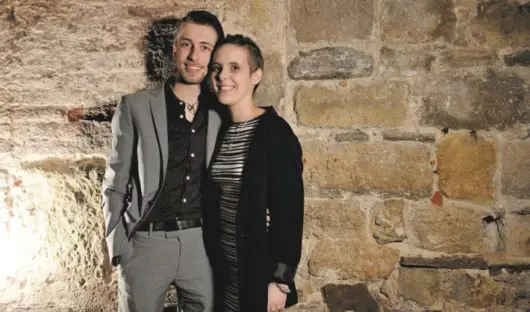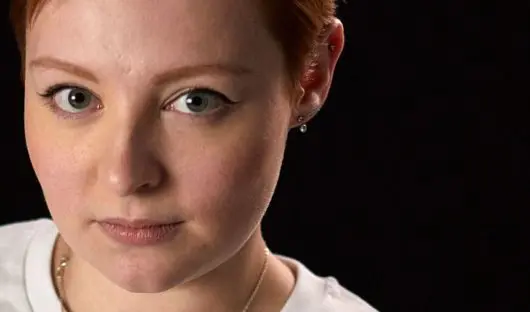Support for LGBTQIA+ young people with cancer
In this blog, Social Care Practitioner Laura Rohdich discusses the kinds of discrimination LGBTQIA+ young people can face in cancer care and shares useful resources for support.
How can being LGBTQIA+ affect your cancer experience?
No young person facing cancer should experience discrimination because of who they are. Unfortunately, research has shown that this does sometimes happen to young people in the LGBTQIA+ community.
I use the acronym LGBTQIA+ (lesbian, gay, bisexual, transgender, queer/questioning, intersex, asexual and other identities) to describe lots of people in this article, and it’s really important to acknowledge that this covers a varied group of people who have a diverse range of experiences, challenges and differing needs.
From screening to treatment, communication, post-treatment, and even in end of life care, all LGBTQIA+ people and those who love them can face discrimination from cancer services.
Don’t just take my word for it – here are some stats from people who’ve done the research (references at the end of this article):
- LGBTQIA+ people are less likely to attend cancer healthcare screenings (like cervical or prostate screenings) or seek health advice due to fear of prejudice. This could mean that they are diagnosed later, and have more advanced cancer when they’re diagnosed.
- LGBTQIA+ people are less likely than heterosexual/cisgender people with cancer to report that they were told sensitively that they had cancer.
- 44% of adolescent and young adult LGBTQIA+ cancer patients said they had experienced discrimination of some form during their treatment.
- LGBTQIA+ patients are less likely than straight/cisgender people to say they believe that hospital staff always did everything they could to control their pain.
- LGBTQIA+ patients and carers report persistent insensitive behaviour regarding their home and family life and status of partners.
- LBGTQIA+ patients were less likely to have advanced care planning or legal issues addressed towards the end of their lives, and their partners were less likely to receive bereavement support.
- While healthcare staff generally feel comfortable treating LGBTQIA+ patients, their knowledge is low particularly when it comes to trans and gender-diverse patients.
Most of these statistics are about older cancer patients. When specifically looking at young people who are LGBTQIA+ and their experiences of cancer care, there is so little research it is disappointing and worrying in equal measure.
Part of the reason for this is because historically when scientists and researchers have looked at huge healthcare datasets, information about gender identity and sexual orientation has not been included. Thankfully the UK is making steps to address this data gap.
What should I do if I experience discrimination?
If you feel you’re being discriminated against because of your sexuality or gender identity, a good first step is to talk to someone from your healthcare team (if you feel comfortable doing so). This can include your Social Worker or Youth Support Coordinator, it doesn’t have to be someone medical. You can look for someone wearing a Young Lives vs Cancer Pride badge or NHS Rainbow Badge if you’re not sure who could understand the situation. Your team may not have realised that there’s a problem and will appreciate your feedback.
If this doesn’t help, you could talk to the service at your hospital that helps patients resolve concerns:
- Patient Advice and Liaison Service (PALS) in England and Wales
- Patient Advice and Support Service (PASS) in Scotland
- Your local health and social care trust’s complaints manager in Northern Ireland.
You could also contact a support service like the Switchboard or the LGBT Foundation. Our support team are happy to help, or you could contact one of the organisations in the ‘support resources’ section below.
Support resources
If you’re a young LGBTQIA+ person with cancer (or you love somebody who is), there’s a growing number of useful and inclusive resources and support networks out there. Click the arrows below to find out more.
Often resources about cervical screening and breast checks only talk about women, but Coppafeel has wonderful resources on its website for trans and non-binary people to access on these topics. There are dedicated cervical screening and sexual health services for trans and non-binary people in Brighton, Leeds, Manchester, London, Liverpool and Glasgow. Prostate Cancer UK also has guidance on prostate cancer screening for trans women and non-binary people on their website.
If you are a trans or non-binary young person, the NHS Youth Form has written comprehensive guidance regarding your rights when accessing healthcare. This includes information on your rights to privacy, changing your records, guidance on how to advocate for yourself, and information about the referral process to the Gender Identity Development Service.
If you or your healthcare team need advice and support about your transition related care, there is a new service called the UK Cancer and Transition Service (UCATS). You can either self-refer, or your team can contact them directly (with your permission).
Macmillan have recently produced a booklet for people who are LGBTQIA+. It has information about navigating healthcare, cancer, and cancer treatment. You can read the booklet on their website. There is also an audio version and easy read version.
OUTpatients is a cancer support and advocacy charity for the LGBTQIA+ community. They provide opportunities for LGBTQIA+ people affected by cancer to meet and share their experiences, as well as high quality information and resources on their website. Their resources include information for intersex people, and a comprehensive sex and cancer guide. They have also recorded a podcast with Shine Cancer Support called ‘Queer with Cancer’. If you work in healthcare, have a look at the resources section on their website – they have a very informative booklet for healthcare staff entitled ‘Breaking down barriers to LGBTIQ+ inclusive cancer care’.
Teenage Cancer Trust has information on their website for LGBTQIA+ young people on your feelings, your rights, and what you can expect from your healthcare team when being treated for cancer. This is a really useful resource if you feel any of your healthcare staff have been intentionally or unintentionally discriminatory towards you because of your gender identity or sexuality. The Macmillan website also has helpful information on this topic.
Trekstock have a great series of talks about living with and beyond cancer in your 20s and 30s called Lifting the Lid. The series features a panel on cancer in the LGBTQIA+ community which you can watch on YouTube. They also have a really informative article on their website about sexual health and sex for LGBTQIA+ young people with cancer.
Our promise to LGBTQIA+ young people going through cancer
We recognise our responsibility in supporting LGBTQIA+ communities. We exist to help children and young people with cancer, which means we exist to help LGBTQIA+ young people and their families. All children and young people with cancer and their families should have the same opportunities and access to care as anyone else.
Find out more about our Pride Promise
References
Bristowe, K., Marshall, S., and Harding, R. (2016). The bereavement experiences of lesbian, gay, bisexual and/or trans* people who have lost a partner: A systematic review, thematic synthesis and modelling of the literature. Palliative Medicine, 30(8), 730–744.
Burki, T K (2021) The challenges of cancer care for the LGBTQ+ community. The Lancet, 22, 8.
Day, Aasma. Young LGBTQI+ people ‘significantly’ more distressed when seeking cancer treatment due to discrimination fears. i News. 22 February 2022: https://inews.co.uk/news/cancer-treatment-young-lgbtqi-people-more-distressed-discrimination-fears-1441660
Macmillan Cancer Support. LGBT People with Cancer: The Emerging Picture. September 2014: http://be.macmillan.org.uk/Downloads/CancerInformation/RichPicture/RP-LGBT-people-with-cancer.pdf
Meagher, Sophie. Addressing inequalities in LGBT cancer screening coverage. PHE Screening Blog. 15 March 2019: https://phescreening.blog.gov.uk/2019/03/15/addressing-inequalities-in-lgbt-cancer-screening-coverage/
Ussher, Jane et al. (2021). Attitudes, Knowledge and Practice Behaviours of Oncology Health Care Professionals towards Lesbian, Gay, Bisexual, Transgender, Queer and Intersex (LGBTQI) Patients and their Carers: A Mixed-Methods Study. Patient Education and Counseling.
Wakefield, Donna. Cancer care disparities in the LGBT community. Current Opinion in Supportive and Palliative Care. September 2021, volume 15, issue 3, 174-179.


